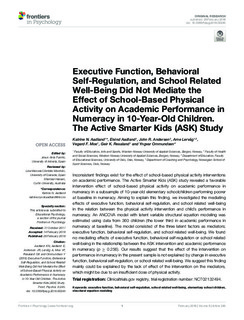Executive Function, Behavioral Self-Regulation, and School Related Well-Being Did Not Mediate the Effect of School-Based Physical Activity on Academic Performance in Numeracy in 10-Year-Old Children : The Active Smarter Kids (ASK) Study
Aadland, Katrine Nyvoll; Aadland, Eivind; Andersen, John Roger; Lervåg, Arne; Moe, Vegard Fusche; Resaland, Geir Kåre; Ommundsen, Yngvar
Journal article, Peer reviewed
Published version
Permanent lenke
http://hdl.handle.net/11250/2581322Utgivelsesdato
2018Metadata
Vis full innførselSamlinger
Originalversjon
Aadland, K. N., Aadland, E., Andersen, J. R., Lervåg, A., Moe, V. F., Resaland, G. K., & Ommundsen, Y. (2018). Executive function, behavioral self-regulation, and school related well-being did not mediate the effect of school-based physical activity on academic performance in numeracy in 10-year-old children: The active smarter kids (ask) study. Frontiers in Psychology, 9. 10.3389/fpsyg.2018.00245Sammendrag
Inconsistent findings exist for the effect of school-based physical activity interventions on academic performance. The Active Smarter Kids (ASK) study revealed a favorable intervention effect of school-based physical activity on academic performance in numeracy in a subsample of 10-year-old elementary schoolchildren performing poorer at baseline in numeracy. Aiming to explain this finding, we investigated the mediating effects of executive function, behavioral self-regulation, and school related well-being in the relation between the physical activity intervention and child’s performance in numeracy. An ANCOVA model with latent variable structural equation modeling was estimated using data from 360 children (the lower third in academic performance in numeracy at baseline). The model consisted of the three latent factors as mediators; executive function, behavioral self-regulation, and school related well-being. We found no mediating effects of executive function, behavioral self-regulation or school related well-being in the relationship between the ASK intervention and academic performance in numeracy (p >- 0.256). Our results suggest that the effect of the intervention on performance in numeracy in the present sample is not explained by change in executive function, behavioral self-regulation, or school related well-being. We suggest this finding mainly could be explained by the lack of effect of the intervention on the mediators, which might be due to an insufficient dose of physical activity.

